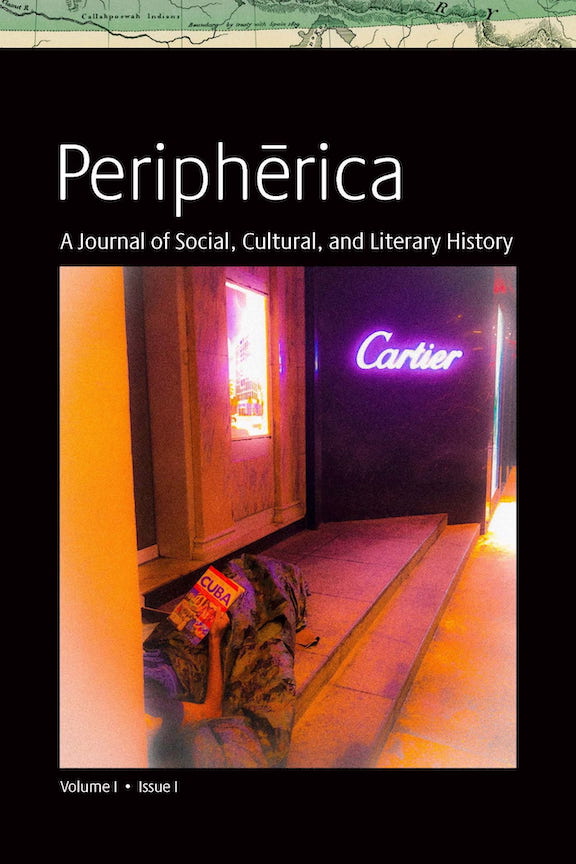“Esa euforia rusófila”: La opinión americana sobre la Unión Soviética durante la Segunda Guerra Mundial a partir de <i>La consagración de la primavera</i> de Alejo Carpentier.
##plugins.pubIds.doi.readerDisplayName##:
https://doi.org/10.5399/uo/peripherica.1.1.7Laburpena
Abstract: In Chapter IV: 22-23 of La consagración de la primavera by Alejo Carpentier, the main character Enrique is in New York. It is January 1943. The Second World War has begun. In contrast to what happens in the Spanish Civil War in the novel, which is told in the first person by the protagonist, the Second World War is told by the press. While reading journals and newspapers, Enrique observes a strange phenomenon that the novel defines as ‘euforia rusófila”. A lot of novels, films and articles in newspapers portrays the ideological enemy as a sort of a close friend to the USA, and the Russian people as hard worker, as well as honest and brave people. Is it an invention of an imaginative novelist or this description stems from a realistic portrays by the author? To verify it, we analyzed the books, articles and films that was produced during the short time in which Enrique was in New York. This article tries to check how, against the official narrative of the history, Carpentier grasps this forgotten historical episode and expresses it in one of his most important novels.Erreferentziak
Bambery, Chris (2015). Historia marxista de la Segunda Guerra Mundial. Barcelona: Pasado & Presente.
Beevor, Antony (2012). La Segunda Guerra Mundial. Barcelona: Pasado & Presente.
Bourke-White, Margaret (1942). Shooting the Russian War. New York: Simon and Schuster.
Carpentier, Alejo (2015). La consagración de la primavera. Edición crítica de David Becerra Mayor. Madrid: Akal [1978].
____ (1984). «Papel social del novelista». En Ensayos. La Habana: Letras Cubanas, 161-181.
Davies, Joseph E. (1941). Mission to Moscow. New York: Simon and Schuster.
Dennett, Raymond; and Joseph E. Johnson, eds. (1951). Negotiating with the Russians. Boston: World Peace Foundation.
González Echevarría, Roberto (1980). «Historia y alegoría en la narrativa de Carpentier», Cuadernos Americanos, nº 1 (enero-febrero), 200-220.
Herring, Jr., George C. Aid to Russia. 1941-1946. Strategy, Diplomacy, the Origins of the Cold War. New York: Columbia University Press, 1973.
Levering, Ralph B. (1976). American Opinion and the Russian Alliance (1939-1945). The University of North Carolina Press.
Lovenstein, Meno (1941). American Opinion of Soviet Russia. Washington: American Council on Public Affairs.
Margolin, Arnold D. (146). From A Political Diary. Russia, the Ukraine, and America (1905-1945). New York: Columbia University Press.
Pauwels, Jacques R. (2002). El mito de la guerra buena. Hondarribia: Hiru, 2002.
Reston, James B. (1943). Prelude to Vitory. New York: Afred A Knopt.
Rodríguez Puértolas, Julio (1998). Introducción a La consagración de la primavera, Madrid, Castalia, 9-88.
Small, Melvin. «How We Learned to Love the Russians: American Media and the Soviet Union During the World War II». The Historian. Vol. 36, nº 3 (May 1974), 455-478.
Walsh, Warren B. «American Attitudes toward Russia». The Antioch Review, Vol. 7, nº 2 (Summer, 1947), pp. 183-190.
Webb, Sidney; and Beatrice Webb. The truth about Soviet Russia. New York: Longmas, Green and Co. 1942 .
Willen, Paul (1954). «Who ‘Collaborated’ with Russia». The Antioch Review, Vol. 14, nº 3 (Autumn, 1954), pp. 259-283
Williams, Albert Rhys (1943). The Russians. The Land, The People, and Whet They Fight. New York: Harcourt, Brace and Company.
Willkie, Wendell L. One World. New York: Simon and Schuster. 1943



